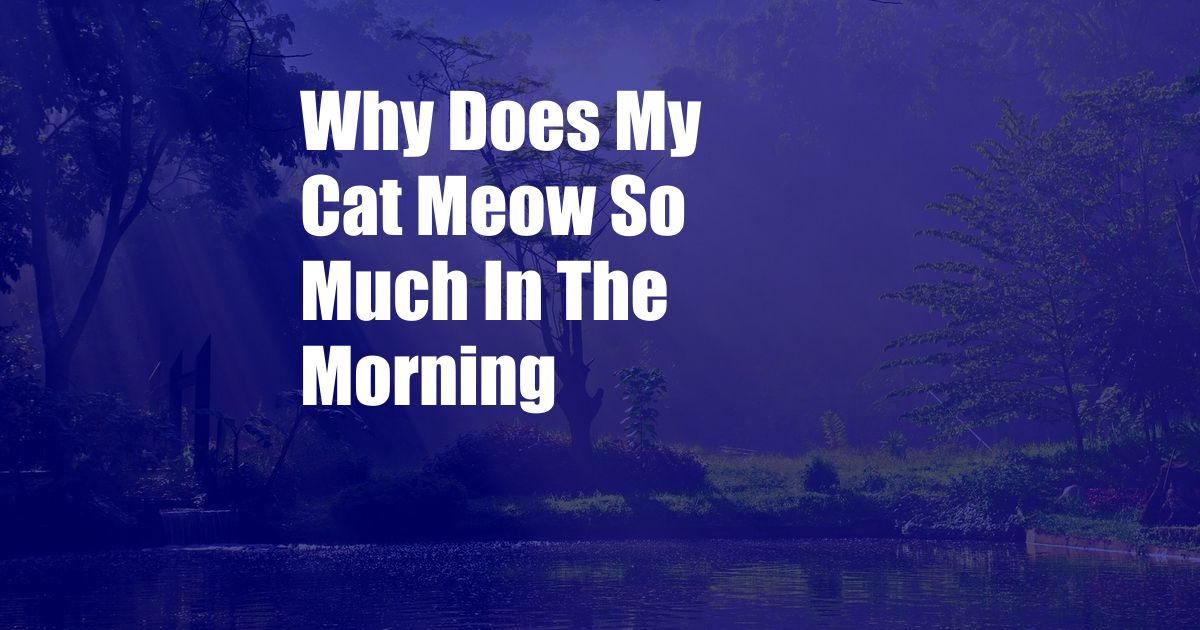
Cats’ Morning Meows: An Exploration of the Underlying Causes
As I lazily drift awake to the rising sun, the tranquility of the morning is abruptly shattered by a chorus of plaintive meows. My furry companion, Miss Marmalade, has a particular fondness for engaging in vocal marathons at the break of dawn, leaving me perplexed as to the reason behind her incessant meowing. Embarking on a quest to unravel this feline enigma, I delved into the depths of cat behavior and discovered a plethora of compelling explanations.
Hunger, Hunger Everywhere
Cats are notoriously known for their voracious appetites, and their persistent meowing in the morning can often be a desperate plea for sustenance. After a long night of fasting while their humans slumber, cats’ stomachs start to growl, triggering an irresistible urge to devour anything edible.
The Call of the Litter Box
Fastidious creatures that they are, cats place a high value on cleanliness. If their litter box has not been recently attended to, they may resort to vocalizing their displeasure and nudging you in the direction of their neglected sanitary facility.
Loneliness and Boredom
Cats are inherently social animals, and they can become lonely and bored if they are left alone for extended periods. When they wake up in the morning feeling isolated, they may meow as a means of summoning their humans and seeking companionship.
Seeking Attention
Some cats meow simply to get their humans’ attention. If they have learned that meowing prompts you to give them pets, treats, or playtime, they may engage in this behavior repetitively as a way to manipulate you into fulfilling their desires.
Cognitive Decline
In senior cats, excessive meowing can sometimes be a sign of cognitive decline. As their brains age, they may experience disorientation and confusion, leading them to meow excessively as a form of communication or distress.
Medical Conditions
Although less common, underlying medical conditions can occasionally trigger excessive meowing in cats. Pain, discomfort, or thyroid issues may cause them to vocalize as a means of seeking help or expressing their distress.
Expert Advice and Tips for Addressing Feline Meows
- Establish a Regular Feeding Schedule: Stick to a set feeding time in the morning to prevent hunger-induced meows.
- Provide a Clean and Accessible Litter Box: Keep the litter box spotless and easily accessible to avoid any discomfort or reluctance to use it.
- Spend Quality Time with Your Cat: Dedicate time each morning to interacting with your cat, providing them with affectionate strokes, grooming, or playtime.
- Create a Calm Environment: Reduce noise and chaos in the morning to create a stress-free environment for your cat, minimizing their need to meow for attention.
- Consult a Veterinarian: If your cat’s excessive meowing persists or is accompanied by other symptoms, don’t hesitate to consult a veterinarian to rule out any underlying medical conditions.
Frequently Asked Questions on Morning Cat Meows
Why does my cat meow specifically in the morning?
Morning meows are often triggered by hunger, a dirty litter box, or the need for attention after a long night without human interaction.
How can I train my cat to stop meowing in the morning?
Establish a regular feeding schedule, provide a clean litter box, spend quality time with your cat, and create a calming environment to curb excessive meowing.
Is excessive morning meowing a sign of health issues?
While uncommon, excessive meowing can sometimes be a symptom of cognitive decline or underlying medical conditions. Consult a veterinarian if you are concerned about your cat’s behavior.
Conclusion
The reasons behind why cats meow excessively in the morning are as diverse as the cats themselves. From hunger pangs to loneliness and even medical conditions, understanding the underlying causes is crucial for addressing this behavior and fostering a harmonious coexistence with our feline companions. Remember, with patience, understanding, and a willingness to adjust our routines, we can create an environment where morning meows become a thing of the past—or at least a less frequent occurrence.
So, the next time your cat insists on serenading you at the break of dawn, don’t dismiss their cries as mere annoyances. Embrace the opportunity to understand their needs and deepen the bond you share. After all, in the grand symphony of cat communication, every meow holds a meaning.